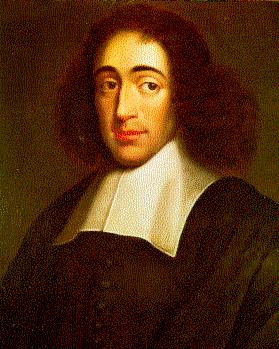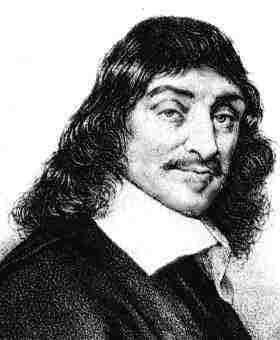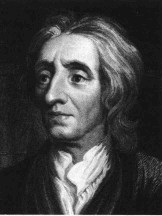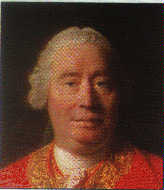Syllabus for PHIL 413.500: History of Modern Philosophy
Spring 2005; Dr. Stephen H. Daniel
Monday and Wednesday
![]()
History of Modern Philosophy examines the major themes and figures of the classical modern period (the 17th and 18th Centuries).
Texts: The Rationalists by Descartes, Spinoza, Leibniz (Anchor
Books)
The Empiricists by Locke,
Berkeley, Hume (Anchor Books)
Prolegomena to any Future
Metaphysics by Immanuel Kant (Carus/Ellington
trans., Hackett Pub.)
Recommended secondary source: A History of Philosophy, Frederick Copleston, vols. 4-6.
|
Class meeting |
Topic |
Assigned |
|
Jan. 19 |
Introduction; Hobbes metaphysics (notes)* |
(Copleston V: Ch. 1) |
|
Jan. 24 |
Hobbes political theory (notes)* |
(Copleston V: Ch. 2) |
|
Jan. 26 |
Descartes: Meditations I & II |
112-27 |
|
Jan. 31 |
Descartes: Meditations III |
128-43 |
|
Feb. 2 |
Descartes: Meditations IV & V |
144-59 |
|
Feb. 7 |
Descartes: Meditations VI |
160-75 |
|
Feb. 9 |
Malebranche (notes)* |
(Copleston IV:180-204) |
|
Feb. 14 |
Spinoza: God |
179-208 |
|
Feb. 16 |
Spinoza: mind-body |
208-48 |
|
Feb. 21 |
Spinoza: emotions |
248-74, 321-24, 378-82 |
|
Feb. 23 |
Leibniz: Discourse on Metaphysics |
409-433 (top) |
|
Feb. 28 |
Leibniz: Discourse on Metaphysics |
433 (top)-453 |
|
Mar. 2 |
Leibniz: Monadology |
455-71 |
|
Mar. 7 |
Mid-semester exam |
|
|
Mar. 9 |
Locke: Ideas |
7-40 |
|
Mar. 21 |
Locke: Liberty, substance, identity |
40-75 |
|
Mar. 23 |
Locke: knowledge |
75-133 |
|
Mar. 28 |
|
135-63 |
|
Mar. 30 |
|
163-85 |
|
Apr. 4 |
Berkeley: minds |
185-215 |
|
Apr. 6 |
Hume: skepticism |
307-334 |
|
Apr. 11 |
Hume: causality |
334-64 |
|
Apr. 13 |
Hume: freedom, miracles |
364-404 |
|
Apr. 18 |
Hume: religion |
404-30 |
|
Apr. 20 |
Kant: critique of reason |
Proleg 1-34 |
|
Apr. 25 |
Kant: categories |
Proleg 35-63 |
|
Apr. 27 |
Kant: Ideas |
Proleg 64-84 |
|
May 2 |
Kant: limits of metaphysics |
Proleg 85-116 |
|
May 6 (Friday) |
Final Exam |
|
*No summaries are allowed to be turned in for Hobbes and Malebranche.
Office:
Office hours: Monday & Wednesday
Phone: 845-5619 (office), 846-4649 (home)
Email: sdaniel@people.tamu.edu
Website: http://people.tamu.edu/~sdaniel/413sy05.html
Grades/Tests
The semester grade is based equally on two in-class essay-format tests, the
mid-semester exam and the final exam. In addition, on five occasions (but at
least three times before the mid-semester exam) you have to write a two-page
summary of the daily reading. These summaries add extra points to a test score:
A=2 1/2 pts, B=1 1/2 pts, C=1/2 pt. Summaries must be turned in at the
beginning of the class in which the readings are discussed. Failure to submit
summaries will result in -4 pts each. (For more on how to write the summaries, see below.) In addition to the five required
summaries, you can write as many other summaries as you want for extra points.
There are 27 days when we have readings, but summaries cannot be submitted for the three days we cover Hobbes and Malebranche. The 24 remaining days provide you with the opportunity to add up to 60 points to one of your test scores. There is no grade for attendance, but if you miss a class it usually affects how I grade your answers on tests. If you miss the mid-semester exam, you must arrange to take the make-up exam before the next class meeting (less than 48 hours later).
· Students with disabilities are guaranteed a learning environment that provides for reasonable accommodation of their disabilities. If you believe you have a disability requiring accommodation, please contact the Department of Student Life, Disability Services, Cain Hall B118, or call 845-1637.
Information on cheating and plagiarism can be found at http://www.tamu.edu/aggiehonor/acadmisconduct.htm.
Guidelines for the Summaries
Summaries should address the question: What are the main points discussed in the assigned readings? Do not bother with biographical or historical remarks about the philosopher or statements about how “for centuries philosophers have debated …”: focus on the arguments presented. Summaries should be limited solely to the points raised in the readings; they are not intended as opportunities for you to say how you agree or disagree with the author. You can use secondary sources (e.g., Copleston) to help explain the reading, but you should not rely excessively on them. For example, suppose you are summarizing Descartes' argument for the existence of God in Meditations III and need to explain his distinction between objective and formal reality. You can refer to the distinction and the discussion in Copleston easily and quickly by saying something like, "According to Descartes, even though my ideas (e.g., of infinite being) are all modifications or 'forms' of my mind that depend on my thinking them, their content or 'objective reality' does not depend on me (Copleston, 4: 99-102)." In this way, you clarify a topic that is not explained by Descartes in the primary reading by parenthetically referring to your secondary source. Finally, make sure you cover all assigned pages.
![]()
![]() Send
Dr. Daniel a message: sdaniel@people.tamu.edu
Send
Dr. Daniel a message: sdaniel@people.tamu.edu
(If you are sending a message from a campus terminal, don't forget to
include your email address in the message so that he can reply to you.)
![]()







